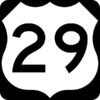Palafox Street

| |
| Palafox Street | |
| Former names: | George Street Calle de Palafox |
|---|---|
| South end: | Pensacola Bay |
| Major junctions: |
Main Street Garden Street Cervantes Street Fairfield Drive Pace Boulevard Brent Lane |
| North end: | Michigan Avenue/Brent Lane |
| Namesake: | José de Palafox y Melzi |
Palafox Street is a major and historic north-south artery in Pensacola. It serves as the dividing line for all the city's east-west streets. Palafox is also the southernmost segment of US Highway 29, which terminates at Cervantes Street in downtown Pensacola. Palafox Street is named for José de Palafox y Melzi, a Spanish nobleman and military hero.
The southern terminus of Palafox Street is Plaza de Luna on Pensacola Bay. Its northern terminus is at Michigan Avenue, just north of Beverly Parkway/Brent Lane, where the road splits into Pensacola Boulevard and Old Palafox Highway.
Between Garden and Wright Streets there is a median separating the northbound and southbound lanes, where tracks of the Pensacola streetcar system formerly ran. The median has since been landscaped and is home to Martin Luther King Jr. Plaza and the 9-11 Homage to America memorial. During the summer months, the median is used for the Palafox Market.
Contents
Palafox Place
In 1979, the City of Pensacola renamed South Palafox Street between Garden and Government Streets as Palafox Place.[1] This section of Palafox is one of Pensacola's most bustling retail districts, although its significance has waned in recent years as retailers have moved out toward shopping centers and malls.
History
In British Pensacola, Palafox was called George Street, for King George III.[2] The street is present on the 1812 Pintado plan, where it is labelled Calle de Palafox.
After a February 3, 1892 ordinance by the provisional municipality of Pensacola, the street was paved and streetcar lines were placed by the Pensacola Terminal Company.[3]
Images
South Palafox Street, 1955. Smoke from wharf fire visible in background.
Palafox Street from Jackson Street south to the Bay; First Baptist Church prominently visible at bottom left. Circa 1960.
North Palafox Street, 1964
References
- ↑ Ordinance #63-79, City of Pensacola.
- ↑ Robinson, Benjamin. An Historical Sketch of Pensacola, Florida. p. 11, 1882.
- ↑ The Federal Reporter, 1895.




